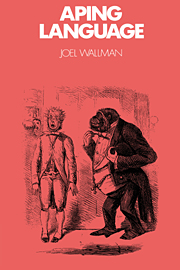Summary
A minimal general definition of syntax would be a rule or set of rules dictating the relationships permissible among the elements of a set. These elements, in addition, must be grouped into categories. The syntactic rules are formulated as permissible relations among those categories, rather than as configurations of the elements themselves. Otherwise, the rules would consist merely of an enumeration of all well-formed expressions (whether sentences, propositions, equations, or designs) in the representational system. In that case, one would have specified not the grammar of the system but the system itself, that is, all of its component expressions. Such an approach is not only ungainly in general but impossible as well for natural languages and all other representational systems that have among their rules recursive functions, since, as discussed in chapter 4, such rules provide for an infinite number of expressions.
It is beyond dispute that all natural languages are predicated on rule systems – grammars – involving elements grouped into nested categories of increasing abstraction. Thus “bird,” an element of English, is a member of the noun category, which in turn is a constituent of the noun phrase, which may be part of a sentence subject or sentence object, components of the category “sentence.” The production and understanding of sentences in a natural language entails the speaker's processing of low-level elements, such as “bird,” but involves also the mental manipulation of the more abstract grammatical constituents.
The rules for forming questions in English are an often-cited and clear example of this.
- Type
- Chapter
- Information
- Aping Language , pp. 79 - 106Publisher: Cambridge University PressPrint publication year: 1992



